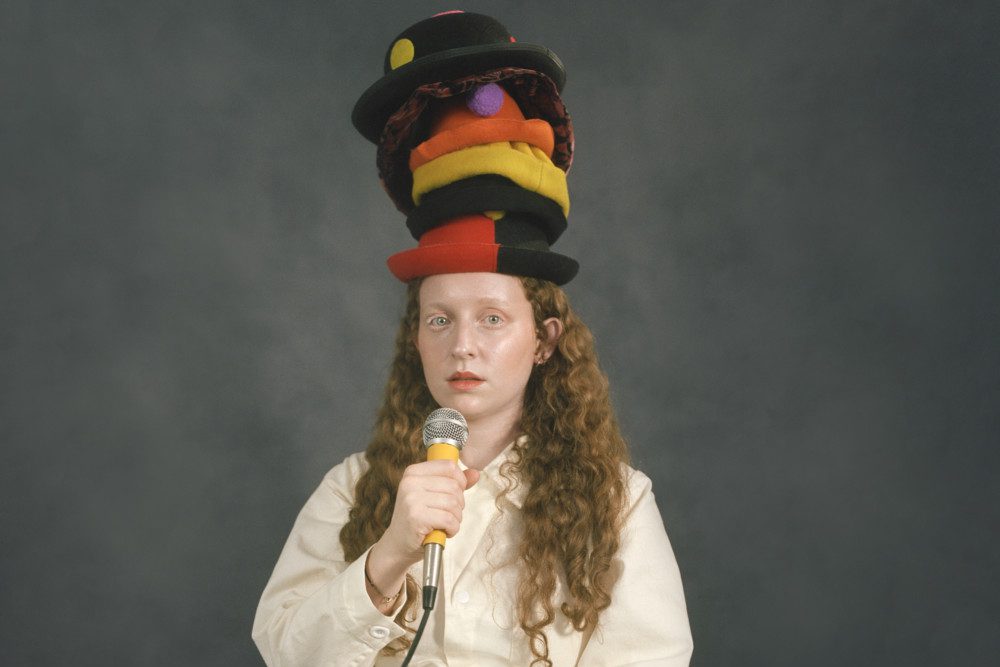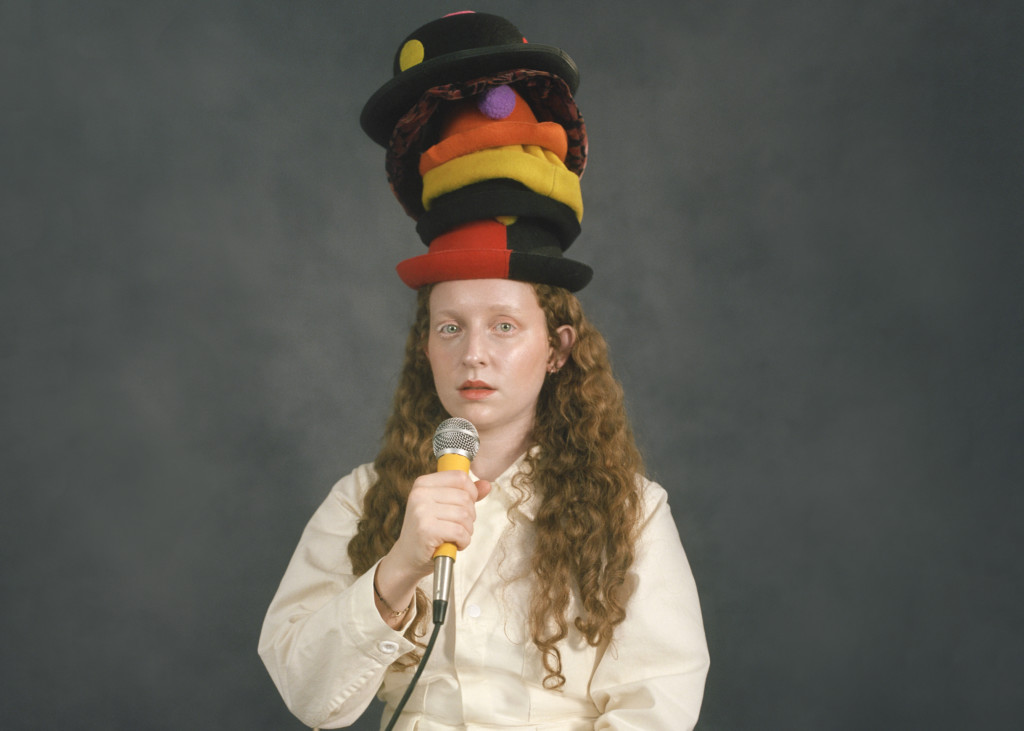BAND OF THE MONTH: Thelma


A guitar is only about eight pounds, but it can feel much heavier when you bear that weight on a shoulder prone to dislocation. Likewise, it’s not easy to play it with swollen and dislocated finger joints. But since she took up playing professionally, Natasha Jacobs – the force behind Brooklyn-based band Thelma – has had to deal with a constant pain that threatened her career. The band released its debut in 2017 while Jacobs studied composition at SUNY Purchase, and while demoing a second record, she began investigating her health issues in earnest. In the course of that journey, Jacobs was diagnosed with unrelated thyroid cancer, which jeopardized her singing voice, and it wasn’t until that was under control that she finally had an explanation for her pain – Ehlers Danlos Syndrome, a genetic disorder that, for her, manifests itself as loose joints and faulty connective tissues. But none of this kept Jacobs from completing her sophomore record, not only because she’s an extremely resilient person, but because, as she would attest to in the very title of the LP, out today, that making music wasn’t just a passing hobby or cold ambition. For her, it was The Only Thing she could imagine doing.
“Apart from music, it just really changed my perspective on life and what I want,” Jacobs says. “Before, I was so focused on making it as an artist, which, we all want that. But I think it really made me value love and friendship in a different way and what I want my life to be like. And also, [I started] really thinking about how you don’t have to be a successful artist to be an artist.” With The Only Thing, Jacobs has learned to be truer to her art: pursuing the pop-oriented sounds that brought her joy as a child; embracing synthesizers because they’re easier for her to “make an aggressive sound with so little effort;” and leaning in to the idiosyncrasies of her voice, which she says friends have described as that of a “primordial baby.”
“In the past I was so focused on trying to make my voice sound perfect or good or something… I realized that wasn’t really working for me,” she admits. “With this record being really symbolic for me, [I was] just trying to have fun playing music, focusing much more on being playful and emotive and just capturing the characters of the songs. I’m a pretty goofy person in general and I feel like my whole life I’ve been known as someone who makes funny voices.” She allows her voice to creak and moan and wail and whisper when the emotional thrust of the song calls for it; even on more abstract tracks like “Sway,” she oscillates between an almost operatic flutter and playful cooing delivery.
Though this way of singing is more akin to the likes of early-aughts freak folksters Joanna Newsom or CocoRosie, Jacobs is indebted to the tongue-in-cheek pop sensibilities of Lana Del Rey and Lady Gaga, too. She inhabits characters, as on “Stranger Love,” who long for the romanticized version of their crushes despite knowing the reality won’t live up to it. The lovelorn narrator of “Take Me To Orlando” is so besought with fantasy that she punctuates her verses with a sharp, breathy intake, almost like a hiccup. Even when she’s adopting these characters, Jacobs’ personality shines through – particularly her sense of humor. In the video for “Stranger Love,” Jacobs leads a geriatric water aerobics class (“That was a real swim class! They let us film it!”) as a sort of metaphor for going through the motions whilst in the throes of unrequited love.
But perhaps the most poignant moments on the record come when Jacobs confronts her health struggles. On “Never Complain,” she seeks a way to “untangle my body like a silver chain;” her voice echoes over distorted guitar, a metaphor for the distance she must cross to do something as simple as go out, “But I do it and never complain.” Jacobs isn’t feeling sorry for herself, just getting caught in a reverie that anyone with a debilitating disorder can relate to. “No Dancing Allowed” has what is perhaps one of the most poignant metaphors for living with chronic pain ever put to song: “Pain is an island with a cabaret law / Right there on the wall / No Dancing Allowed / When I’m alone with no one to enforce, I turn the music loud / My body will remind me, no dancing allowed.” Not only does it suggest her physical discomfort, but also the isolation and frustration that comes along with it.
“I don’t personally have any idol songwriters who have written much about physical pain. I can’t think of many songs that talk about it,” Jacobs notes. “And so much of the population is chronically ill or disabled – I just really hope that these songs can get to those people and help someone in some way.” Jacobs underwent surgery on her shoulder in November to help alleviate some of her pain, though she says it still feels like it’s bruised, with slow healing times being a common issue for those with EDS. She’s on thyroid medication but opted out of surgery due to the threat of vocal paralysis; she monitors it regularly and hopes that if it worsens, there will be less risky treatment options available, and the medical technology around that looks promising. “I feel like I’m still very much in the midst of what I was going through when I wrote the record,” she says, “but I think it will be interesting to see [the songs] from a greater perspective in time.”
For now, she’s realized how many obstacles stand in the way of normalcy for folks with chronic pain and invisible illness. “I would love to tour and I do feel physically capable, but with self-releasing [the LP] and all the money that goes into medical stuff I’m not in a place right now where I can do a ton of DIY touring, physically or financially,” she says. “So many labels, when they reach out to you, they’re like, are you touring? How much DIY touring are you doing? Not only is that really hard or close to impossible for people who are disabled, but it’s also really hard for people who don’t have a lot of money. So I think it’s kind of unfair in many ways, to have those expectations of an artist.” She also says that venues need to step up when it comes to accessibility, and is heartened by the active push for more of that from organizers like Sean Gray of Is This Venue Accessible.
Advocacy was on Jacobs’ mind when she wrote “Chosen Ones,” the album’s stirring closing track and one she says is among her favorites on The Only Thing. She says it was one of the most “impulsively emotive songs” on the album. “The emotion poured out and it happened so quickly and I was like, crying while writing [it],” she remembers. In it, she reminds her inner child that she’s worthy of love, and encourages her to fight for it. “Every day / You’re trying hard just to be brave / For the child screaming bloody murder inside,” she sings, letting her voice flutter wildly. “It’s such a dark thing to say, I just feel like there was no way to say something like that unless you’re doing it kind of wacky,” she says with a laugh. Like many of the songs on this record, the music is disarmingly buoyant given its subject matter, but that’s territory that Thelma navigates handily. “I think that was my only way to cope with what was going on [healthwise],” she says of the album’s swooning string sections and danceable grooves. “Also, it’s funny – I feel so much more since I went through this. I’ve become a much more empathetic person and feel so many more emotions. But I also feel like a little bit – no, a lot – tougher.”
Thelma’s sophomore record The Only Thing is out today; she’s playing a handful of shows over the next few months, where you can cry, dance, or do both, and hopefully say hi.
THELMA TOUR DATES
2/22 – Everybody Hits @ Philadelphia, PA *
2/23 – Secret Project Robot @ Brooklyn, NY *
3/1 – The Chateau @ Albany, NY
3/2 – Wherehouse @ Middletown, CT
* w/ Mutual Benefit



